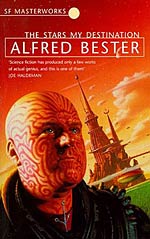
![]() Emil
Emil
7/6/2011
![]()
When I admitted to really liking The Demolished Man (in my review of the latter), I haven't read The Stars My Destination yet. Yes, it's hard to believe that this cult classic never saw me turn its pages. If I really, really liked Bester's Hugo award winner, I'm thoroughly smitten by his 1956 classic, an assault on my senses that lingers like a smoldering coal. Fire destroys, burns and hurts, but is also a harbinger of change. We see this cearly. The final chapter is incredibly moving, pulsating in its hopeful expression that leaves even the reader changed.
Damon Knight most certainly had it all wrong when he wrote of the novel's "bad taste, inconsistency, irrationality, and downright factual errors" (wikipedia). The consequences of matter transmission, or jaunting, are actually well thought through and I found the "Prologue" of Stars more than just a thrilling piece of writing, setting up the world in which jaunting is commonplace with such believable clarity, encompassing a kaleidoscope of ideas that it becomes very easy to forget scientific rules and conventions.
The plot owes an obvious debt to Alexander Dumas' The Count of Monte Cristo (another favourite novel of mine), with its story of a wrongly-imprisoned man, freeing himself and finding great wealth, using it to track down those who wronged him with vengefull obsession. In addition it also recalls and draws from a story about a shipwrecked sailor who survived for months on a raft in the open sea, ignored by passing ships that could have rescued him but for a fear that he may have been a decoy used by Nazi submarines to lure them in. Here, in Stars, Gully Foyle is the sole survivor aboard a wrecked spaceship. He manages to hail a passing ship, the Vorga, but it ignores his distress signals, leaving him to die alone in the emptiness of space. Gully ultimately succeeds to escape his dire circumstances and eventually arrives on Earth where he begins the campaign of vengeance against the crew members of the Vorga. Driving by his overwhelming and all-consuming desire for revenge, he moves closer to Presteign of Presteign, owner of the Vorga, who has his own reasons for wanting to catch Gully. It turns out that quite a few people want Gully Foyle.
It is a breathtaking narrative that rarely pauses as our relentless anti-hero callously pursues his goals. Jaunting lies at the heart of the novel, just as ESP fuelled the plot of The Demolished Man, and the plot moves with the same incredible pace as jaunters would propelling themselves from one destination to another. We are yet again exposed to the absurdity of Bester's inventiveness - it remains remarkable. There are twist and turns and surprising revelations. Ideas that other writers might have stretched out to support an entire novel, Bester simply, recklessly and buoyantly throws around in the space of a few paragrahps (perhaps this is what Damon Knight could not appreciate). Gully Foyle is the main driving force, dominating every page of the book. He is the stereotypical common man, stirred to action by an overpowering wish for vengeance until he is revealed as one who can translocate himself anywhere in the universe - and much more significantly is prepared to "blow open the last star chamber to the world," compelling all his fellow common men to take up the responsibilities that till then had been shouldered or ursuped by a few others, not so "common." Watching Gully Foyle's transformation into a moral creature through a sequence of transfigurations was an exhilirating experience. It cemented him as one of the most unforgettable characters in sf - and yet again, as with The Demolished Man, is testimony to Bester's pyrotechnic display of imagination, revealing just why other writers admire him so much!
"Take a war to make you spend. Take a jam to make you think. Take a challenge to make you great. Rest of the time you sit around lazy, you. Pigs, you! All right, God damn you! I challenge you, me. Die or live and be great. Blow yourselves to Christ gone or come and find me, Gully Foyle, and I make you men. I make you great. I give you the stars."